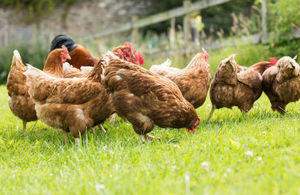Avian flu confirmed in backyard flock in Yorkshire
Restrictions have been put in place around the premises near Settle in North Yorkshire

Bird flu
Read avian influenza (bird flu) in winter 2016 to 2017 or avian influenza (bird flu) detailed guidance for the latest information.
The UK’s Chief Veterinary Officer has confirmed H5N8 avian flu in a small backyard flock near Settle in North Yorkshire.
A 3km Protection Zone and a 10km Surveillance Zone have been put in place around the infected premises to limit the risk of the disease spreading. The remaining live birds in the small flock of chickens and ducks are being humanely culled.
The advice from Public Health England is that the risk to public health from the virus is very low and the Food Standards Agency has made clear that bird flu does not pose a food safety risk for UK consumers.
Chief Veterinary Officer Nigel Gibbens said:
We have taken swift action to limit the risk of the disease spreading. Restrictions are now in place around the affected premises and a full investigation is underway to determine the source of the infection.
This finding in a backyard flock shows how essential it is for all poultry owners, even those who just keep a few birds as pets, to do everything they can to keep them separate from wild birds and minimise the risk of them catching avian flu via the environment.
This means keeping birds in a suitable building where possible, and taking precautions such as putting up netting, keeping food and water inside and disinfecting footwear and equipment after contact with birds.
Bird flu advice for poultry keepers
The Chief Vet has issued practical advice for people with backyard poultry on how to limit the risk to their birds by complying with the prevention order which legally requires them to keep birds separate from wild birds and practicing good biosecurity.
This is the same strain which was found in a backyard flock in Carmarthenshire, Wales, earlier this week, at a turkey farm in Lincolnshire last month and in a number of wild birds in England, Wales and Scotland.
An Avian Influenza Prevention Zone that has been in place since 6 December has been extended until 28 February. The zone requires keepers of poultry and other captive birds to continue to keep their birds indoors, or take appropriate practical steps to keep them separate from wild birds.
Members of the public are encouraged to report dead wild waterfowl (swans, geese or ducks) or gulls, or five or more dead wild birds of other species in the same location, to the Defra helpline on 03459 335577.
Background
-
There were 17 birds in the affected flock, several of which died from the disease.
-
Owners should follow Defra’s biosecurity advice.
-
A Prevention Zone was declared on 6 December 2016 and is in place until 28 February.
-
For advice and guidance on what to do if you keep poultry, or to report suspicion of disease in animals, call the Defra Rural Services Helpline on 03000 200 301. The helpline is open Monday to Friday, 8.30am to 5pm. There is an out of hours facility on the same number for reporting suspicion of disease in animals.
-
Members of the public are encouraged to report dead wild waterfowl (swans, geese or ducks), or other dead wild birds such as gulls or birds of prey, to the Defra helpline on 03459 33 55 77. Defra will then test them to help understand how the disease is distributed geographically and in different types of bird.
-
Latest information and announcements about avian flu in winter 2016 to 2017.
-
For more information on this press release please call Defra press office on 020 8225 7318.